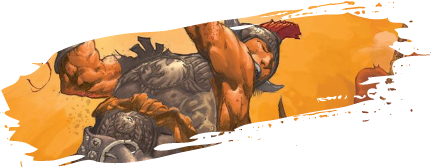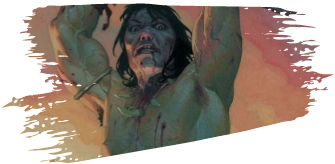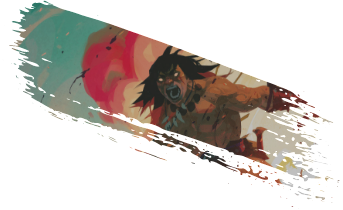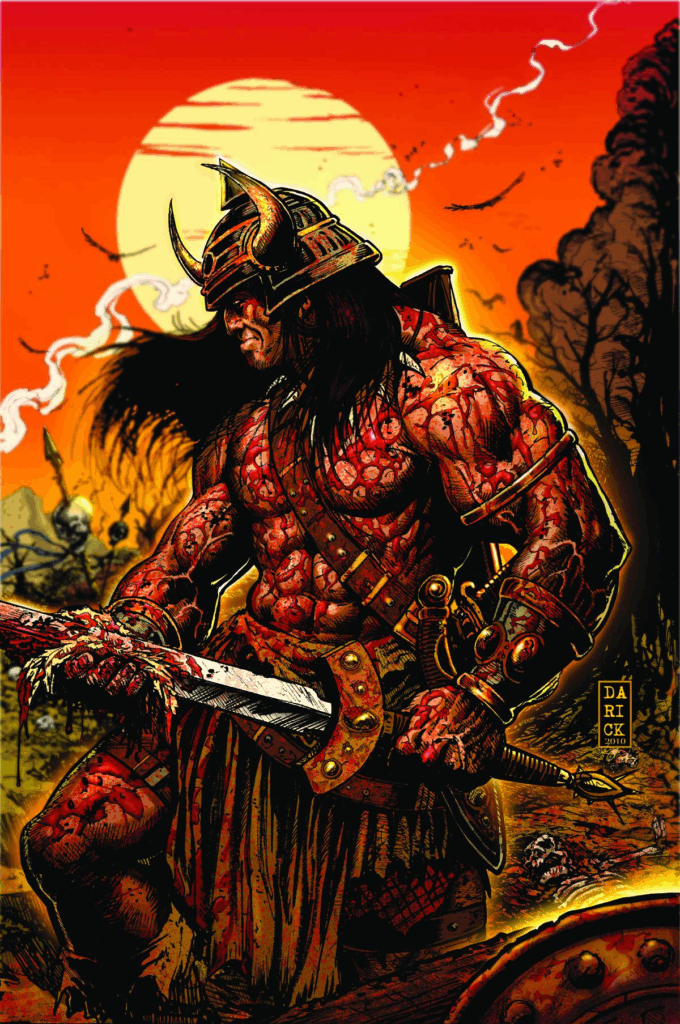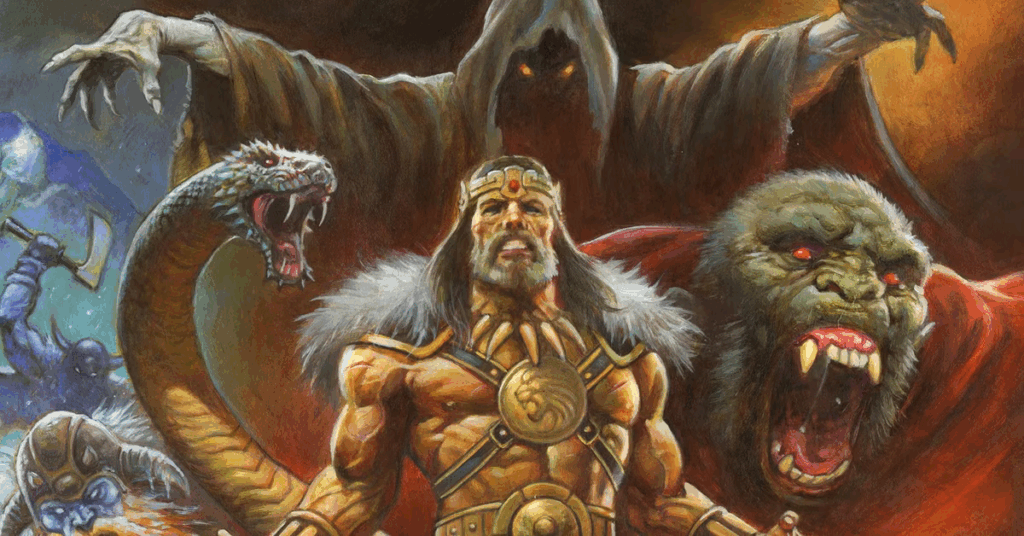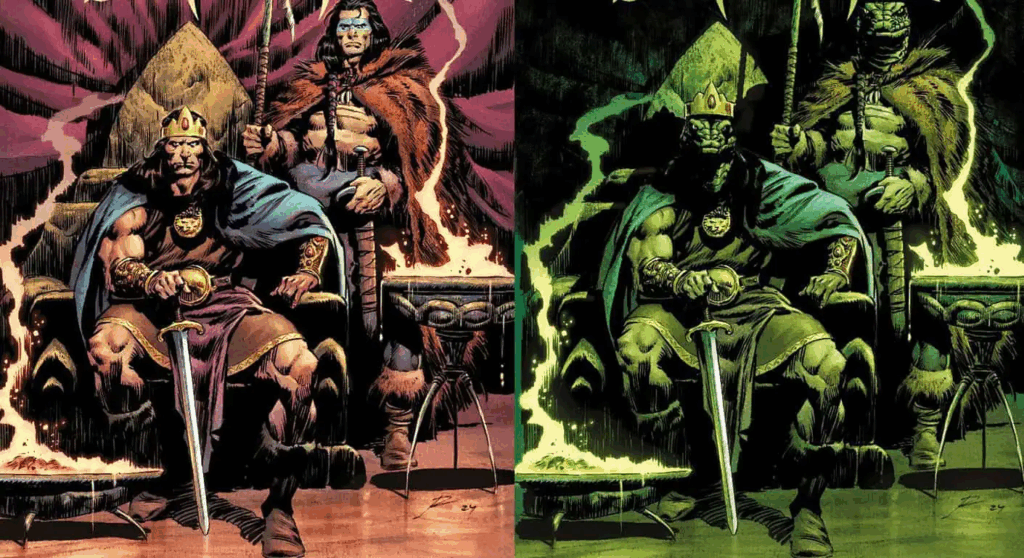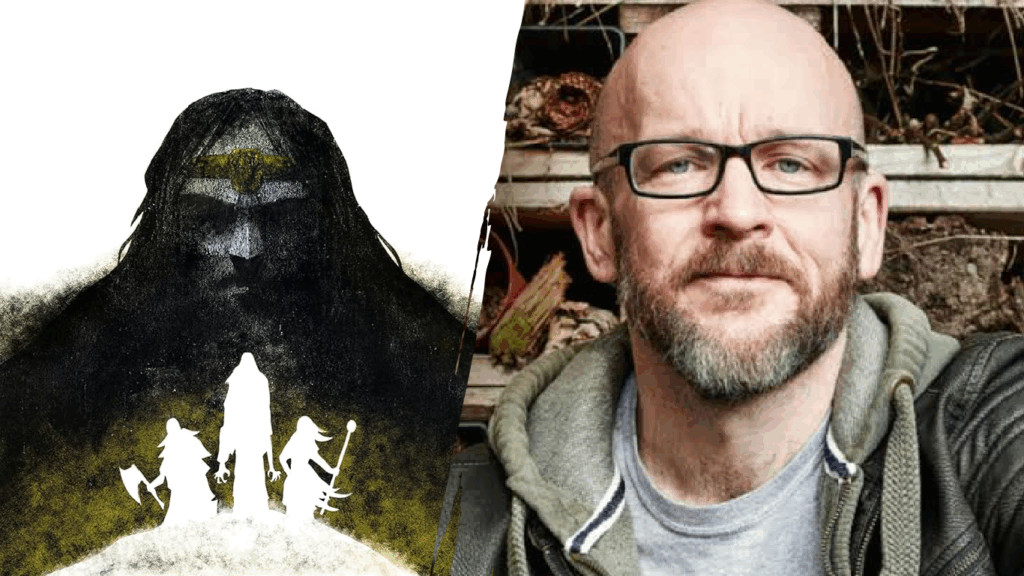
When Tim Lebbon sat down to write a new Conan novel, he didn’t start with the young wanderer we know from so many tales. Instead, he envisioned something far more haunting: an aging king’s sword hanging on the wall, still oiled but heavy with disuse.
“I think it was the idea of his sword hanging on the wall, dulled by time, still oiled but heavy with unuse,” Lebbon says. “And I knew that though Conan was older, with more aches and pains and old injuries that continued to niggle, he’d often stare at the sword and wonder where, and why, his life had changed. He’s a barbarian at heart, after all.”
This image – the world’s most famous barbarian contemplating a weapon grown dusty with peace – drives everything that follows in Lebbon’s tale of King Conan’s return to the wild.
A Promise Forged in Desperation
At the heart of Songs of the Slain lies a debt of honor that pulls Conan from his throne, and its origin comes from one of the most moving sources imaginable. When asked about Baht Tann and why a 40-year-old battlefield promise matters more than a crown, Lebbon shares a deeply personal story:
“This idea behind the story has a basis in fact, and it’s a family story that I thought gave Conan’s task a truly personal feel,” he explains. His father, a WWII veteran who survived the Japanese POW camps and worked on the Death Railway, rarely spoke of his experiences. But one story survived: “One day while they were working on the railway in the unrelenting heat, and these prisoners were kept in terrible conditions, with very limited rations and hardly any water, my dad made a promise to this man. He said if they ever survived the war, he promised that he’d give his companion a few bob for a sip of his water.”
Years later, when that wartime companion visited, Lebbon’s father paid up on his promise. “I still get emotional thinking about it now… a desperate deal made in dire circumstances, when they had no real hope of surviving.”
This becomes the emotional core of Conan’s journey: a promise made when death seemed certain, honored decades later when comfort beckons. It’s this kind of honor that defines Conan more than any crown ever could.
The Burden of Peace
But pulling Conan from his throne requires more than just an old debt. Lebbon crafts a fascinating portrait of what happens when civilization tries to tame the untameable. The novel opens with Conan grown “soft in body and soul,” yet Lebbon is careful about how he portrays this decline.

“Conan’s first few experiences back in the wild trouble him a little, because he can see and sense that he’s lost his feel of the warrior’s touch,” Lebbon explains. “And he makes mistakes, gets injured, and has to weather the results of those injuries. But it doesn’t last for long.”
Drawing from his own experience with endurance sports, Lebbon understands how muscle memory works: “I wanted to show that his time on the throne hadn’t changed him so much as just dulled him a little, and very soon muscle memory – quite literally with Conan – means that he’s back into the flow again.”
This tension reaches its peak in Conan’s farewell to Queen Zenobia. “Though he wanted and needed to go, it wasn’t easy for him to leave Zenobia,” Lebbon reveals. When she asks him to promise he’ll return, Conan’s response reveals who he truly is beneath the crown.
“Conan is always honest. Brutally so, sometimes,” Lebbon notes. “He doesn’t make promises he can’t keep, he’s a man of few words and all of them have meaning.” This inability to lie to his wife showcases a man who needs “a future that he could shape himself, with brain and sword, instead of having it shaped by those around him and the politics that weighed down his throne.”
Lebbon sees this restlessness as fundamental to Conan’s nature: “I think this doubt about the future is part of what drives him, actually. Sat on the throne, safe and comfortable, he’d become bored.” The unknown calls to him stronger than any crown’s security.
The Triptych
Every great Conan story needs villains worthy of his steel, and Lebbon delivers with the triptych: three enemies representing different facets of Conan’s violent history.
Without revealing too much, Lebbon describes them as “a pupil of a mage that Conan killed who is seeking revenge; a younger warrior eager to kill Conan and become the greatest warrior ever; and the child of a knight killed protecting Conan in battle, seeking vengeance for the dead father who Conan never even acknowledged.”
Each villain presented unique challenges. “The mage is a powerful, brutal and monstrous person (who has links to a story from Conan’s past that readers will recognise), and the bad guys are always fun to write!” The warrior, “brash and pompous, undoubtedly powerful but also reliant on a drug for his strength,” represents those who would steal glory rather than earn it.
But it’s the third member who proved most challenging: “The hardest to write was the grieving daughter seeking revenge, because her path through life towards confrontation with Conan required a lot of change, as she learned witching ways and became a much more damaged person in her quest.”
Songs for the Dead
Perhaps Lebbon’s most inspired creation is The Last Song, a troupe of aging warriors who’ve traded swords for instruments. “The original idea was that Conan falls in with a travelling music troupe, then I thought, ‘Well they should be ex-warriors’!”
This concept explores what happens to warriors when the wars end. “I really love the idea of old warriors who have put away their weapons and taken up instruments to write songs about old battles and barbarians. They’re not so much peace-loving as peace-craving.”
The philosophical contrast with Conan is deliberate. “There was never really a chance of him picking up a flute and putting down his sword, but I had fun exploring how old warriors should perhaps start honouring those they’ve left behind rather than just keep fighting. Of course, when they NEED to fight…”
The dynamic between Conan and these retired sellswords creates both tension and dark humor, especially when they insist on composing his death song while he still lives. “I think some people would actually enjoy hearing what others think of them, and hearing songs written about their brave and legendary exploits. But Conan is not at all sentimental and has no ego, so for him it’s simply an annoyance.”
Yet there’s something deeper here about legacy and memory: “If anything, the Song’s tale of Conan would perhaps be more accurate than most because they’re writing it there and then, with him actually present, rather than creating stories from third-hand whispers.”
Blood and Horror in the Hyborian Age
Lebbon doesn’t shy away from the visceral nature of Conan’s world. When wounded Conan first attempts to rob The Last Song, we see fascinating character insights. “Maybe that’s already the Conan from the past returning–his confidence, his belief that he can take on any enemy,” Lebbon explains. “It’s not pride with Conan, not even really self-belief, but rather the fact that he thinks he’s built for this.”
When asked about the most brutal moment in the story, he lights up.
“There’s a scene towards the end when Conan and The Last Song are forced to take on giant zombified marsh drogs… that’s truly grim! I adore that battle, because not only is Conan back at his fiercest and strongest by then, but also it’s a scene filled with a sense of hopelessness that he won’t allow for a second to land.”
What defines Conan in these moments? “Conan never considers defeat. Or if he does, he shrugs it aside and fights on and on… despite the stench of spilled rotted zombie guts from giant marsh drogs.”
This horror element runs throughout the novel, influenced heavily by one particular Howard story. “It was The Scarlet Citadel,” Lebbon reveals. “Some of that story feeds quite heavily into this novel in interesting ways, and readers will soon see how when they start the novel.”
What struck him most were the basement scenes: “For me though, it was Conan being vulnerable and afraid in those dank dark basement cells that really affected me. The horror writer in me loved these scenes too, [as] the serpent and other creatures down there were horrifying, and the shadowy things hinted at even more so.”
This influence shaped the novel’s atmosphere: “In feel and background, Songs of The Slain is very much a horror novel, more so than some Conan stories, and that feel was definitely seeded by The Scarlet Citadel.”
The Landscape of Memory
Lebbon’s choice to send Conan through Ophir and Koth isn’t arbitrary, either; these lands carry weight from Conan’s past, particularly his experiences in The Scarlet Citadel. To bring these kingdoms to life while staying true to Howard’s vision, Lebbon dove deep: “I read as much as I could about these places in the published stories and online resources, and tried to really flesh out these landscapes.”
This research pays off in how geography becomes character. “For me landscape is always a vital part of a story, as it affects actions and reactions, and in Conan’s case it brought back bad memories, and influenced his decisions on his journey to Khoraja.”
This attention to geographical and psychological detail adds layers to what could have been a simple journey narrative. Every league traveled is both physical distance and emotional archaeology, unearthing memories Conan might prefer stayed buried.
Fire That Refuses to Die
As our conversation with Lebbon drew toward its close, we asked Lebbon what he hopes readers take away about aging without weakening. His response resonates beyond the page:
“The fire of youth might dim, but the flames of adulthood can burn just as hot. I’m edging towards my later fifties now, and I still enjoy training for and racing in endurance sports events. It helps to keep the fire alive, and also stokes the flames.”
He sees Conan the same way: “His age is just a number and I don’t think it even crosses his mind, and the events of this novel stir him from a sort of funk he’d sunk into without even realising it.”
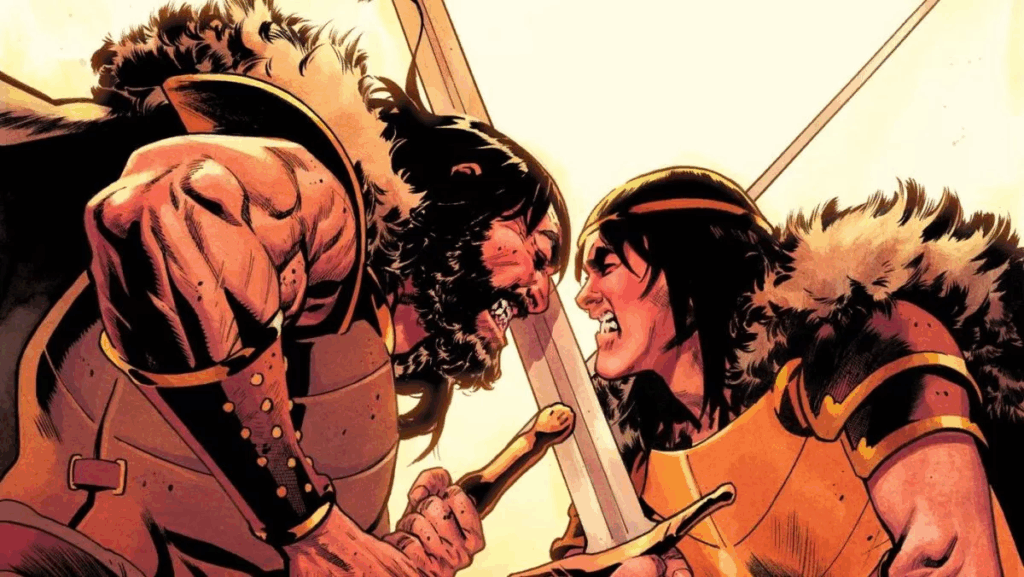
The Moment That Defines a Legend
When asked to choose one scene that captures why Conan endures after 90+ years, Lebbon doesn’t hesitate:
“I love the scene when Conan and the Last Song confront an undead army, and he takes the lead to give them the chance to pick up their weapons again. He understands his abilities and strengths, and doesn’t think twice about marching forward to confront a mass of monstrous, stinking corpses coming to take his head. It’s a moment that Conan was built for.”
This is the Conan we need in 2025: not diminished by age but refined by it, still willing to face the monstrous and impossible because that’s simply who he is. As Lebbon puts it with perfect simplicity: “Conan is back!”
Songs of the Slain by Tim Lebbon releases July 22nd. Don’t wait – preorder your copy now and be among the first to witness Conan’s return to his barbarian roots. For sword and sorcery fans who’ve wondered what happens when the wanderer becomes king – and what happens when the king remembers he’s still a wanderer at heart – this is the Conan novel you’ve been waiting for.


Lo Terry
In his effort to help Heroic Signatures tell legendary stories, Lo Terry does a lot. Sometimes, that means spearheading an innovative, AI-driven tavern adventure. In others it means writing words in the voice of a mischievous merchant for people to chuckle at. It's a fun time.




